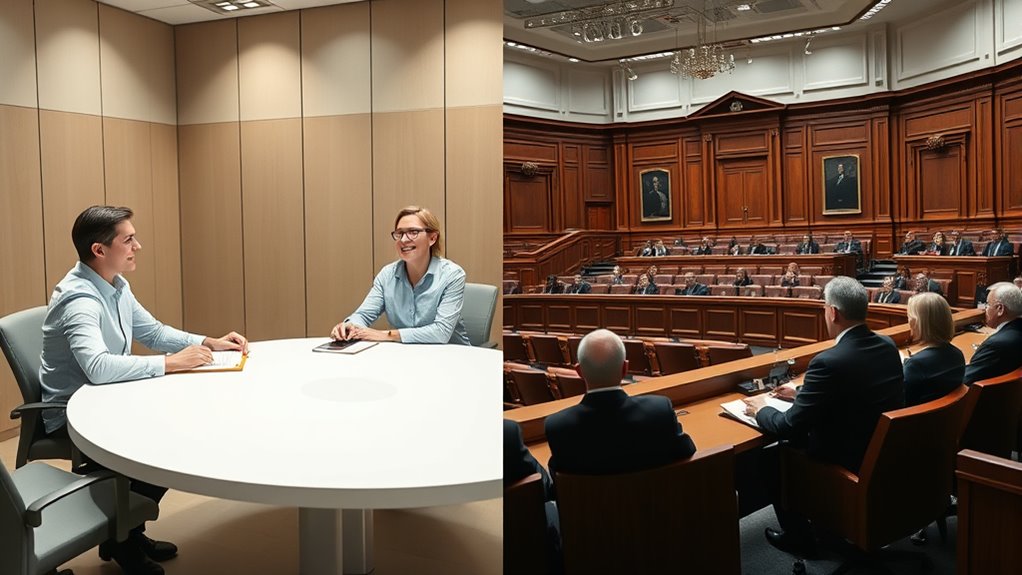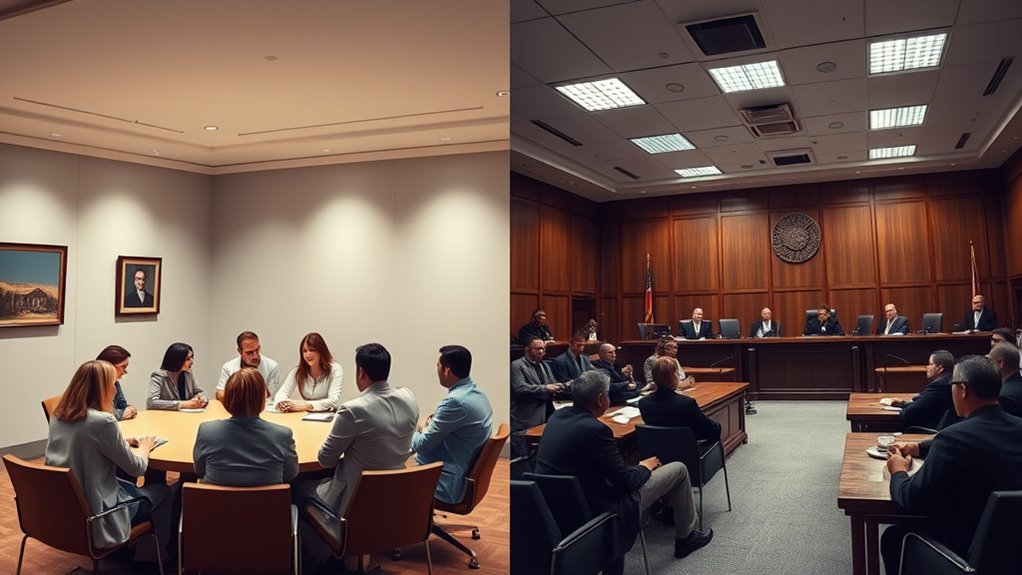When choosing between mediation and litigation, consider your priorities. Mediation offers a faster, more cost-effective, and private way to resolve disputes, allowing you to maintain control and build cooperative solutions. Litigation can be more formal and adversarial, possibly damaging relationships but providing a formal binding outcome. Think about whether preserving ongoing relationships is important or if a court ruling suits your needs better. To gain deeper insights into each approach, explore the detailed differences ahead.
Key Takeaways
- Mediation is more cost-effective, faster, and involves less formal procedure than litigation.
- It fosters open communication and preserves relationships better than adversarial court battles.
- Mediation offers flexible scheduling and allows parties to craft mutually agreeable solutions.
- Litigation provides a formal, legally binding resolution, often at higher costs and longer timelines.
- Choosing mediation is ideal for ongoing relationships and when a collaborative, confidential process is preferred.

When facing a legal dispute, you often have two main options: mediation or litigation. Understanding the differences can help you make the right choice for your situation. One key factor to contemplate is the concept of Alternative Dispute Resolution (ADR), which includes methods like mediation that serve as alternatives to traditional court battles. ADR processes are generally designed to resolve conflicts more efficiently and with less stress, and they often prove to be more cost-effective than going to court. Litigation can be expensive, involving court fees, attorney charges, and lengthy procedures that drain your time and resources. Mediation, on the other hand, offers a more streamlined process, reducing costs substantially because it typically requires fewer sessions and less legal formalities.
Cost effectiveness is a major advantage of choosing mediation over litigation. When you opt for mediation, you often save money because it doesn’t involve the extensive legal processes and procedural delays associated with courts. Instead, you and the other party work with a neutral mediator who facilitates negotiations in a confidential setting. This process can be scheduled more flexibly, often leading to quicker resolutions. The reduced legal expenses and faster turnaround mean you retain more control over your finances and can resolve the dispute without the financial burden that litigation often entails. Additionally, understanding the materials used in tableware can sometimes influence settlement considerations if disputes involve craftsmanship or authenticity.
Mediation saves money through flexible scheduling and fewer legal expenses.
Furthermore, mediation tends to promote better relationships between parties. Since it encourages open communication and mutual problem-solving, it fosters a cooperative environment. This is especially beneficial if you anticipate ongoing interactions with the other party, such as in business or family disputes. Litigation, by contrast, is adversarial and often damages relationships, which can be a considerable drawback if maintaining a positive connection is important.
Choosing mediation also gives you more control over the outcome. Unlike a court decision, which is determined by a judge or jury, mediation allows you and the other party to craft a mutually agreeable resolution. This flexibility often results in more satisfactory and sustainable solutions, saving you from potential appeals or ongoing disputes. If cost effectiveness and the ability to manage the process are priorities for you, mediation presents a compelling alternative to costly, time-consuming litigation.
Frequently Asked Questions
Can Mediation Be Used for All Types of Disputes?
Mediation can be used for many types of disputes, but not all. It’s a popular alternative dispute resolution option that works well for conflicts like family, workplace, or contract issues. However, some disputes, especially those involving criminal matters or significant legal rights, may require litigation. Always consider confidentiality considerations, as mediation offers a private environment, making it a preferred method for sensitive cases.
How Long Does Litigation Typically Take to Resolve?
Litigation’s trial duration varies but often takes 12 to 24 months, depending on case complexity and court schedules. Settlement timelines can speed up resolution, sometimes within a few months if parties agree early. You might face delays if there are multiple hearings or appeals. To avoid lengthy processes, consider alternative methods like mediation, which can resolve disputes more quickly and flexibly, often in a matter of weeks.
What Are the Costs Differences Between Mediation and Litigation?
The cost comparison between mediation and litigation is like night and day—you’ll find mediation generally much more affordable. Mediation’s expense factors include facilitator fees and session time, usually amounting to a few thousand dollars. Litigation, on the other hand, involves court costs, legal fees, and prolonged proceedings, often totaling tens of thousands. If budget is a concern, mediation offers a clear advantage in controlling expenses and avoiding hefty legal bills.
Is Mediation Legally Binding?
Mediation is generally not legally binding unless you both agree to make the resolution enforceable. You should consider enforceability considerations before finalizing your agreement, as it can be turned into a legally binding contract if drafted properly. If you want your mediation agreement to be legally binding, make sure that you include enforceability language and have it reviewed by a legal professional. This helps protect your rights and ensures compliance.
Can Parties Switch From Mediation to Litigation Later?
Did you know about 95% of disputes settle before reaching court? You can shift from mediation to litigation later if needed. After a post-resolution, parties often choose court involvement for unresolved issues or enforcement. Keep in mind, moving from one process to another might require new filings and could affect your timeline and costs. It’s essential to consult your attorney to understand how this change impacts your case and future legal options.
Conclusion
Like steering a river’s twists and turns, choosing between mediation and litigation shapes your journey. Mediation’s calm waters allow for collaboration and mutual understanding, much like guiding a boat gently to shore. Litigation, however, resembles a stormy sea—more confrontational and unpredictable. By understanding these paths, you can steer wisely toward resolution, ensuring your course leads to calmer waters or a victorious voyage. Your choice determines whether you sail smoothly or weather the storm.










